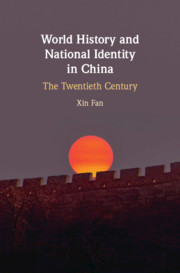Book contents
- World History and National Identity in China
- World History and National Identity in China
- Copyright page
- Dedication
- Contents
- Figures and Tables
- Preface and Acknowledgments
- Introduction: Control and Resistance
- 1 The Confucian Legacy
- 2 The Cultural Destiny
- 3 Becoming the “World”
- 4 The Forced Analogy
- 5 Imagining Global Antiquity
- Conclusion: World History and the Value of the Past
- List of Characters
- Bibliography
- Index
4 - The Forced Analogy
Control, Resistance, and World History in the 1950s
Published online by Cambridge University Press: 19 February 2021
- World History and National Identity in China
- World History and National Identity in China
- Copyright page
- Dedication
- Contents
- Figures and Tables
- Preface and Acknowledgments
- Introduction: Control and Resistance
- 1 The Confucian Legacy
- 2 The Cultural Destiny
- 3 Becoming the “World”
- 4 The Forced Analogy
- 5 Imagining Global Antiquity
- Conclusion: World History and the Value of the Past
- List of Characters
- Bibliography
- Index
Summary
In the 1950s, the increasing pressure of state control had a subtle effect on the position of world history within the general discipline of history in China. World historians remained a vulnerable minority among the community of historians. This chapter examines why many historians chose to dismiss the universalism espoused by China’s world historians as a “forced analogy.” For many historians, this universalism was an unwelcome ideological Marxist intrusion into historical studies; moreover, world historians who were working closely with the state were not considered serious scholars. Owing to such attitudes, many historians neglected the significant developments that took place in world-historical studies at the time. Among these, as the chapter contends, were various attempts by world historians to place China within a world-historical narrative that is based on a non-Eurocentric schema. The debates between Lin Zhichun and Tong Shuye on the Asiatic mode of production are indicative of this alternative perspective. These developments planted the seeds for the future development of the field.
Keywords
- Type
- Chapter
- Information
- World History and National Identity in ChinaThe Twentieth Century, pp. 128 - 152Publisher: Cambridge University PressPrint publication year: 2021

